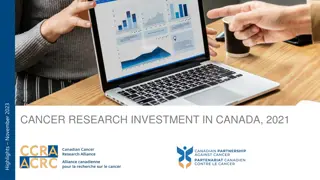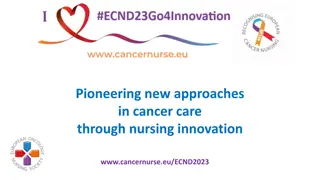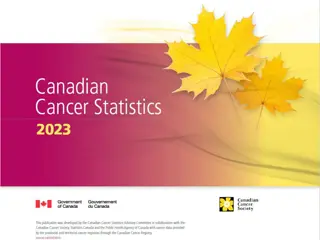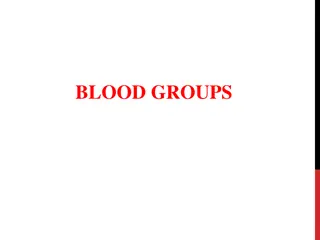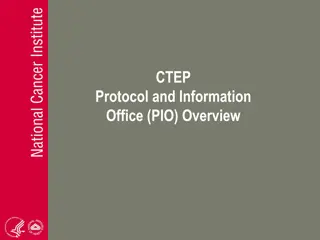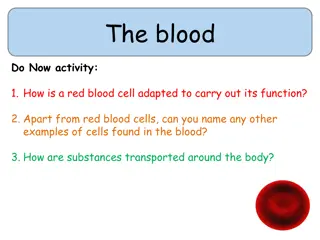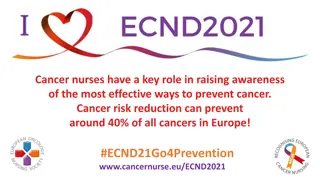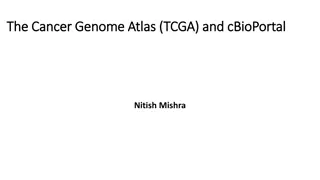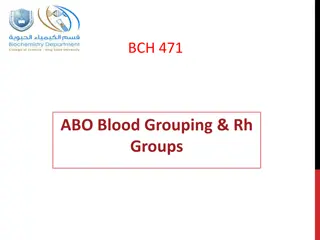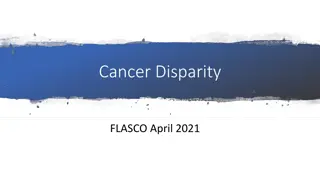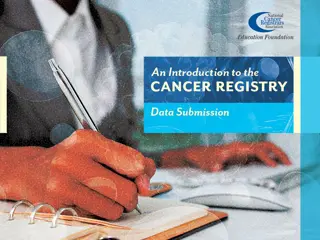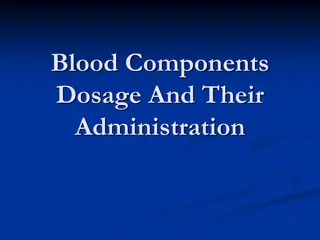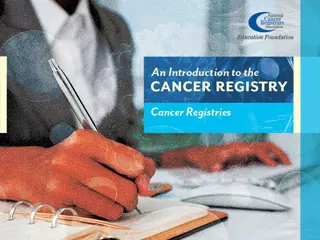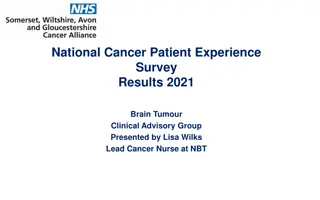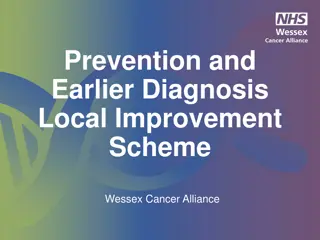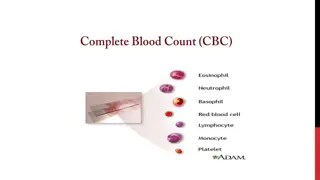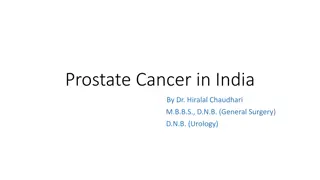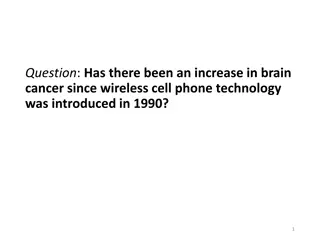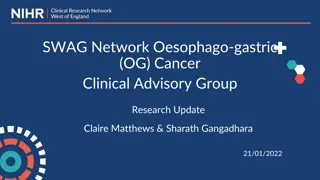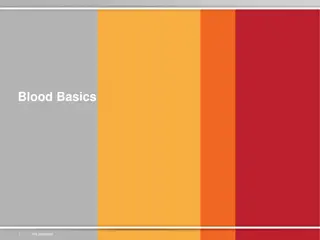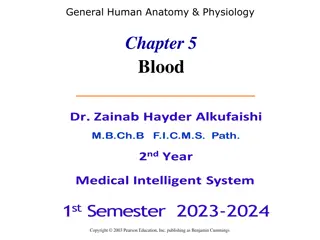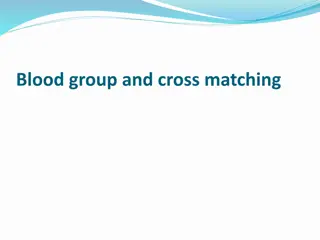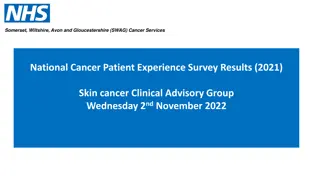What you need to know about the HPV Vaccine
Globally, cervical cancer is the fourth most common cancer in women, with 6,04,000 new cases in 2020. Women living with HIV are 6 times more likely to develop cervical cancer, compared to the general population, and an estimated 5% of all cervical cancer cases are attributable to HIV. The contributi
3 views • 7 slides
Cancer Research Investment in Canada - Highlights November 2023
The Canadian Cancer Research Alliance (CCRA) is a collaboration of organizations funding cancer research in Canada to advance prevention, diagnosis, and treatment. Established in 2005, CCRA has grown to over 35 members and published strategic plans to enhance cancer research outcomes. The Alliance s
2 views • 40 slides
Pioneering new approaches in cancer care through nursing innovation
Pioneering cancer nurses in Europe are driving advancements in cancer care through innovative approaches, evidence-based knowledge, and personalized patient-centered care. They play a vital role in cancer prevention, healthcare policy enhancement, and education improvement. By putting patients and f
0 views • 12 slides
Europe Cancer Diagnostics Market: Emerging Trends in Liquid Biopsy and Next-Gene
The Europe Cancer Diagnostics Market is projected to reach $12.21 billion by 2031, at a CAGR of 5.6% during the forecast period 2024\u20132031. The Europe cancer diagnostics market is driven by the rising prevalence of cancer, supporting initiatives for early cancer diagnosis, increasing investments
3 views • 4 slides
Canadian Cancer Statistics 2023 Overview
The Canadian Cancer Statistics 2023 report provides a comprehensive analysis of cancer data, including trends, statistics, and insights for the year. The report covers various aspects of cancer, such as incidence rates, survival rates, types of cancers diagnosed, and advancements in cancer treatment
0 views • 31 slides
Understanding Blood Groups and Their Significance
Human blood types are determined by specific antigens and antibodies present on red blood cells, influencing crucial aspects like blood transfusions and familial relationships in forensic medicine. The ABO system, with its four main blood types (A, B, AB, O), plays a vital role in categorizing blood
7 views • 14 slides
Cancer Therapy Evaluation Program (CTEP) Overview
The Cancer Therapy Evaluation Program (CTEP) aims to enhance cancer patients' lives by advancing cancer treatment through research and clinical trials. The Program includes a Protocol and Information Office (PIO) to streamline trial development processes. It funds national cancer research and focuse
0 views • 27 slides
Introducing Sirush Cancer Treatment Protocol: A Breakthrough in Cancer Therapy
This research introduces the Sorush Cancer Treatment Protocol (SCTP), a novel approach developed by Dr. Somayeh Zaminpira and Dr. Sorush Niknamian based on successful cancer treatment methodologies. The protocol combines a Specific Ketogenic Diet (SKD), intravenous ozone therapy, and various supplem
0 views • 6 slides
Understanding Blood Cells and Transport Mechanisms
Your blood, consisting of red blood cells, white blood cells, platelets, and plasma, plays a crucial role in transporting substances like oxygen, nutrients, and waste products throughout your body. Red blood cells are specialized for oxygen transport due to their unique adaptations, while white bloo
2 views • 18 slides
Empowering Cancer Prevention Through Nurse-Led Initiatives
Cancer nurses play a crucial role in raising awareness about effective cancer prevention methods, supporting the European Code Against Cancer, providing advice for risk reduction, promoting health literacy, and encouraging early diagnosis through screening programs. Their expertise and leadership ar
0 views • 30 slides
Understanding the Cancer Genome Atlas (TCGA) Project
The Cancer Genome Atlas (TCGA) project, initiated in 2005, aims to identify genetic mutations in cancer through genome sequencing. Supervised by the Center for Cancer Genomics, TCGA has expanded over the years, publishing numerous research articles and involving various tumor types. The project has
0 views • 7 slides
Understanding ABO Blood Grouping and Rh Groups
ABO blood grouping and Rh factor testing are crucial for blood transfusions and forensic medicine. The presence or absence of specific antigens and antibodies in human blood determines blood type. Genetic inheritance from parents establishes blood type, with codominance influencing offspring phenoty
0 views • 13 slides
Cancer Survival Rates in Europe: Trends and Disparities
Cancer survival rates in Europe have shown variations across different types of cancer and countries. While overall cancer mortality has increased over the years, some countries have experienced declines in mortality rates. Survival rates for breast cancer between 1995-2014 ranged from 74% to 89%, w
0 views • 17 slides
Understanding Cancer Health Disparities and Initiatives
Exploring the concept of cancer health disparities, this content touches on the National Cancer Act of 1971, the impact of social determinants of health, and various initiatives such as the National Minority Cancer Awareness Week. It highlights efforts to reduce disparities through research, advocac
6 views • 8 slides
Understanding Bowel Cancer: Facts, Prevention, and Awareness Efforts
Bowel cancer, also known as colorectal cancer, is a significant health concern, being the fourth most common cancer in the UK. It is essential to be aware of the symptoms, risk factors, and preventive measures associated with this condition. By maintaining a healthy diet, managing body weight, and s
0 views • 9 slides
Understanding Cancer: Causes, Symptoms, and Prevention
Cancer is a disease characterized by the uncontrollable growth and spread of abnormal cells in the body. These cells form tumors that can be either cancerous (malignant) or non-cancerous (benign). Cancer can develop in various parts of the body and is often caused by genetic changes that affect cell
3 views • 21 slides
Understanding Data Submission in Cancer Registry Systems
Data submission in cancer registry systems serves the purpose of contributing to a larger pool of information for monitoring cancer trends, determining patterns, guiding program planning, and assisting public health professionals. Organizations like the State Central Cancer Registries and national p
1 views • 11 slides
Advances in Anticoagulation Therapy for Cancer-Related VTE and Stroke
Recent studies have shown advancements in anticoagulation therapy for cancer patients with venous thromboembolism (VTE) and stroke prevention. Direct oral anticoagulants (DOACs) are now considered beneficial for treating VTE in cancer, offering advantages in administration and efficacy. Different an
3 views • 9 slides
Understanding Blood Components and Their Administration
Effective blood transfusion therapy relies on the availability and proper administration of various blood components. Separating blood components allows for better patient care by matching transfusions to individual needs and avoiding unnecessary components. Different blood products like packed red
1 views • 27 slides
Humber, Coast and Vale Cancer Alliance - Cancer Champions Programme Overview
The Humber, Coast and Vale Cancer Alliance's Cancer Champions Programme, led by Trish Rawnsley, aims to raise awareness and promote early diagnosis of cancer. Developed in North East Lincolnshire in 2011, the program has trained almost 1,000 individuals, resulting in lower emergency presentations in
0 views • 10 slides
Understanding Cancer Registries and Their Significance
Cancer registries serve as vital information systems for collecting, storing, and analyzing cancer data to aid in research, prevention, treatment, and public health efforts. They help track cancer incidence, assist in identifying trends, and provide essential information to healthcare professionals
0 views • 18 slides
Patient Mobility and Cancer: Role of Joint Actions in European Cancer Care
Activities focusing on standardizing cancer care in Europe include quality assurance of screening programs, defining survivorship, establishing Comprehensive Cancer Control Networks, addressing socio-economic inequalities, and promoting public health genomics. The European Cancer Patient Coalition e
0 views • 7 slides
National Cancer Patient Experience Survey 2021 Results Overview
National Cancer Patient Experience Survey (NCPES) for 2021 focused on brain tumour patients and was led by Lisa Wilks, the Lead Cancer Nurse at NBT. The survey, commissioned by NHS England, aimed to monitor cancer care progress, drive quality improvements, and inform stakeholders. Methodology includ
0 views • 26 slides
Alcohol and Cancer Risk: Understanding the Links
Alcohol consumption is linked to an increased risk of various cancers, including mouth, throat, esophagus, breast, liver, and colorectal cancers. Factors such as ethanol, acetaldehyde, nutrient absorption, estrogen levels, and liver cirrhosis play a role in this risk. Even light drinking can elevate
0 views • 17 slides
Debunking Common Myths About Cancer and Nutrition
The journey of cancer diagnosis brings forth various challenges, including misconceptions about nutrition. Debunking myths like soy stimulating cancer cells, sugar feeding cancer, and acidic diets curing cancer is crucial for informed decision-making. Evidence shows that soy can be a part of a healt
1 views • 11 slides
Cancer Rehabilitation and Transformation Project Overview
Lead by Catherine Neck, the Macmillan Cancer Rehabilitation/Recovery Package Project aims to enhance cancer care services. The Cancer Transformation Funding supports initiatives for breast, colorectal, and prostate cancers, including holistic needs assessments and wellbeing events. The SWAG Cancer A
0 views • 7 slides
Wessex Cancer Alliance Local Improvement Scheme for Cancer Prevention and Early Diagnosis
This scheme by Wessex Cancer Alliance focuses on improving prevention and early diagnosis of cancer at the local level, with funding allocated on a per-patient basis. Requirements include appointing clinical and non-clinical cancer champions, completing reporting tasks, and participating in webinars
0 views • 6 slides
Global Cancer Statistics and Trends
The data presented showcases global cancer statistics from various years, highlighting the prevalence of different types of cancer across genders. It includes information on the estimated number of cancer cases, common types of cancers, and trends expected up to 2035. Lung cancer, breast cancer, and
0 views • 83 slides
Integration of Complementary Medicine in Cancer Care in Tuscany
Describes the successful integration of Complementary Medicine in the network of Cancer Departments within the Tuscan Public Healthcare System. The initiative, spearheaded by experts in both Complementary Medicine and medical oncology, has led to the development of Regional Guidelines incorporating
0 views • 4 slides
Understanding Complete Blood Count (CBC) Test
Complete Blood Count (CBC) is a panel of tests that evaluates different types of blood cells, including red blood cells, white blood cells, and platelets. CBC helps diagnose various blood disorders and monitor conditions that affect blood cells, such as anemia or infections. The test is ordered base
0 views • 20 slides
Kentucky Cancer Registry - COVID-19 Impact on Cancer Patients
The Kentucky Cancer Registry addresses the impact of COVID-19 on cancer patients, highlighting increased risks, altered treatment plans, and the importance of adjusting therapies to reduce infection rates. The registry emphasizes the higher incidence of COVID-19 in cancer patients compared to the ge
1 views • 58 slides
Understanding Prostate Cancer in India
Prostate cancer is a significant health concern among men, characterized by abnormal cell growth in the prostate gland. This cancer can spread locally or metastasize, leading to different stages such as localized, locally advanced, and metastatic prostate cancer. Dr. Hiralal Chaudhari explains the c
0 views • 14 slides
Examining the Relationship Between Wireless Technology and Brain Cancer
The introduction of wireless cell phone technology in 1990 has raised concerns about potential links to brain cancer. However, studies from organizations like the American Cancer Society and the International Committee on Non-Ionizing Radiation Protection have not found evidence supporting an increa
0 views • 25 slides
Understanding Cancer Survival Statistics in England
Cancer survival statistics in England, analyzed in collaboration between Public Health England (PHE) and the Office for National Statistics (ONS), provide crucial insights into the effectiveness of cancer services. These statistics measure the mortality rates of cancer patients and inform various st
0 views • 25 slides
Cancer Types Spending in Europe
Learn about the spending on various types of cancer in Europe including breast cancer, colorectal cancer, prostate cancer, lung cancer, ovary cancer, and pancreatic cancer. The information is based on the Comparator Report on Cancer in Europe 2019, which covers disease burden, costs, and access to m
2 views • 7 slides
SWAG Network Oesophago-gastric Cancer Research Update
SWAG Network Oesophago-gastric (OG) Cancer Clinical Advisory Group provided a research update on Upper GI Cancer Studies, National Recruitment data, and Regional Recruitment trends in the UK. The update included information on open cancer studies, sample sizes, recruitment statistics, and participat
0 views • 16 slides
Understanding the Basics of Blood and Transfusions
Blood is a vital tissue that performs essential functions like delivering oxygen and nutrients, maintaining immunity, and controlling body temperature. Blood transfusions save lives by treating accident victims, transplant recipients, cancer patients, and those with blood-related diseases. Component
0 views • 20 slides
Understanding Blood: Composition and Functions
Blood is a vital fluid tissue in the human body, classified as a connective tissue. It consists of living cells known as formed elements suspended in a non-living matrix called plasma. The physical characteristics of blood, such as color range, pH level, and temperature, play crucial roles in mainta
0 views • 33 slides
Understanding Blood Group and Cross Matching in Transfusion Medicine
Blood group and cross matching play crucial roles in determining blood compatibility for transfusion. The presence or absence of specific antigens on red blood cells, along with antibody reactions, help identify blood types and ensure safe transfusions. Cross matching involves testing donor and reci
0 views • 8 slides
SWAG Cancer Services National Cancer Patient Experience Survey Results 2021 Overview
The SWAG Cancer Services National Cancer Patient Experience Survey Results for 2021 provide insights into the experiences of skin cancer patients in Somerset, Wiltshire, Avon, and Gloucestershire. The survey, commissioned by NHS England, aims to monitor progress in cancer care, drive local quality i
0 views • 27 slides

